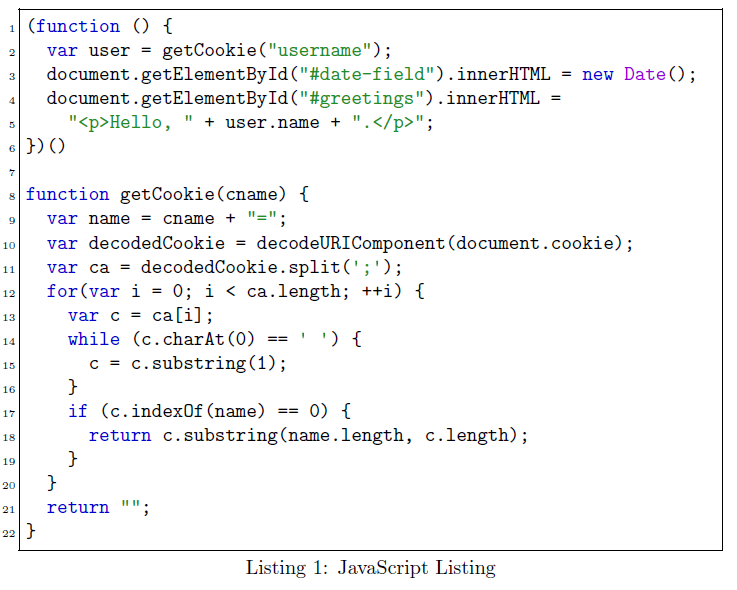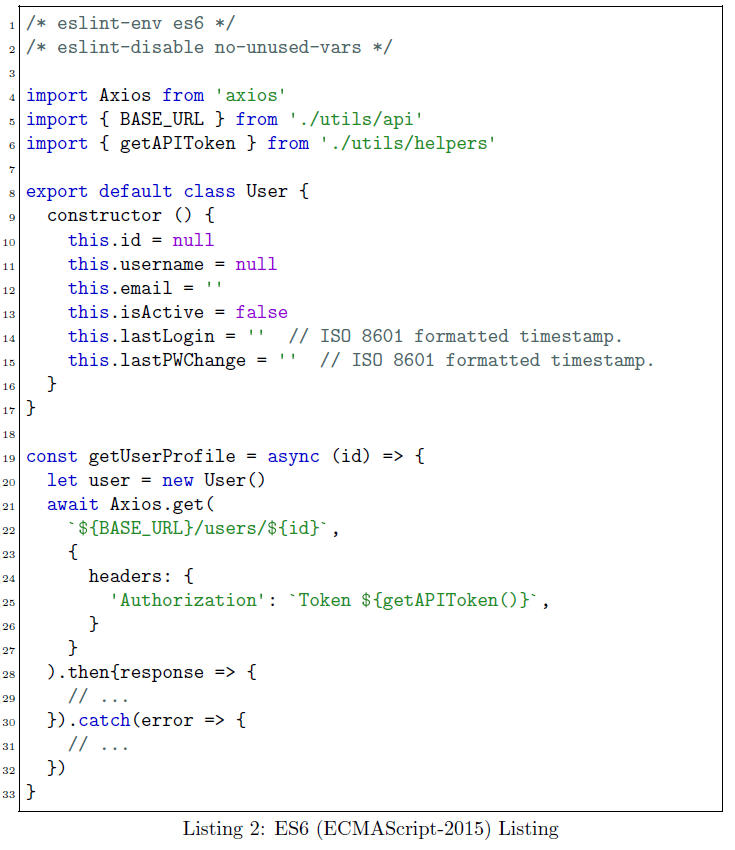The LaTeX listings package does not include (by default) a language specification for JavaScript/ECMAScript. However, the package provides the capability to create custom languages and styles based on built-in methods. These methods were used to create listings languages for JavaScript and ES6 (ECMAScript 2015).
First, the JavaScript version 1.1 definition is built in a way to allow for modifications to be built upon the basic language. Reference the JavaScript v1.1 specification.
\lstdefinelanguage{JavaScript}{
morekeywords=[1]{break, continue, delete, else, for, function, if, in,
new, return, this, typeof, var, void, while, with},
% Literals, primitive types, and reference types.
morekeywords=[2]{false, null, true, boolean, number, undefined,
Array, Boolean, Date, Math, Number, String, Object},
% Built-ins.
morekeywords=[3]{eval, parseInt, parseFloat, escape, unescape},
sensitive,
morecomment=[s]{/*}{*/},
morecomment=[l]//,
morecomment=[s]{/**}{*/}, % JavaDoc style comments
morestring=[b]',
morestring=[b]"
}[keywords, comments, strings]\begin{lstlisting}[style=JavaScript, caption={JavaScript Listing}]
(function () {
var user = getCookie("username");
document.getElementById("#date-field").innerHTML = new Date();
document.getElementById("#greetings").innerHTML =
"<p>Hello, " + user.name + ".</p>";
})()
function getCookie(cname) {
var name = cname + "=";
var decodedCookie = decodeURIComponent(document.cookie);
var ca = decodedCookie.split(';');
for(var i = 0; i < ca.length; ++i) {
var c = ca[i];
while (c.charAt(0) == ' ') {
c = c.substring(1);
}
if (c.indexOf(name) == 0) {
return c.substring(name.length, c.length);
}
}
return "";
}
\end{lstlisting}ES6 adds additional keywords and interpolated string capability. So these need to be reflected in the language defintion for listings. The ECMAScript2015 dialect of the JavaScript language uses the base language and adds the additional keywords and string interpolation.
There is an alias to map the language ES6 to the ECMAScript2015 dialect such that language=ES6 is the same as language=[ECMAScript2015]JavaScript.
\lstalias[]{ES6}[ECMAScript2015]{JavaScript}\lstdefinelanguage[ECMAScript2015]{JavaScript}[]{JavaScript}{
morekeywords=[1]{await, async, case, catch, class, const, default, do,
enum, export, extends, finally, from, implements, import, instanceof,
let, static, super, switch, throw, try},
morestring=[b]` % Interpolation strings.
}\begin{lstlisting}[style=ES6, caption={ES6 (ECMAScript-2015) Listing}]
/* eslint-env es6 */
/* eslint-disable no-unused-vars */
import Axios from 'axios'
import { BASE_URL } from './utils/api'
import { getAPIToken } from './utils/helpers'
export default class User {
constructor () {
this.id = null
this.username = null
this.email = ''
this.isActive = false
this.lastLogin = '' // ISO 8601 formatted timestamp.
this.lastPWChange = '' // ISO 8601 formatted timestamp.
}
}
const getUserProfile = async (id) => {
let user = new User()
await Axios.get(
`${BASE_URL}/users/${id}`,
{
headers: {
'Authorization': `Token ${getAPIToken()}`,
}
}
).then{response => {
// ...
}).catch(error => {
// ...
})
}
\end{lstlisting}The listings package also has the built-in capacity for custom styling the language definitions. The styles presented in the typeset images were generated using:
% Requires package: color.
\definecolor{mediumgray}{rgb}{0.3, 0.4, 0.4}
\definecolor{mediumblue}{rgb}{0.0, 0.0, 0.8}
\definecolor{forestgreen}{rgb}{0.13, 0.55, 0.13}
\definecolor{darkviolet}{rgb}{0.58, 0.0, 0.83}
\definecolor{royalblue}{rgb}{0.25, 0.41, 0.88}
\definecolor{crimson}{rgb}{0.86, 0.8, 0.24}
\lstdefinestyle{JSES6Base}{
backgroundcolor=\color{white},
basicstyle=\ttfamily,
breakatwhitespace=false,
breaklines=false,
captionpos=b,
columns=fullflexible,
commentstyle=\color{mediumgray}\upshape,
emph={},
emphstyle=\color{crimson},
extendedchars=true, % requires inputenc
fontadjust=true,
frame=single,
identifierstyle=\color{black},
keepspaces=true,
keywordstyle=\color{mediumblue},
keywordstyle={[2]\color{darkviolet}},
keywordstyle={[3]\color{royalblue}},
numbers=left,
numbersep=5pt,
numberstyle=\tiny\color{black},
rulecolor=\color{black},
showlines=true,
showspaces=false,
showstringspaces=false,
showtabs=false,
stringstyle=\color{forestgreen},
tabsize=2,
title=\lstname,
upquote=true % requires textcomp
}
\lstdefinestyle{JavaScript}{
language=JavaScript,
style=JSES6Base
}
\lstdefinestyle{ES6}{
language=ES6,
style=JSES6Base
}
